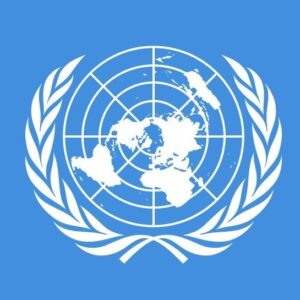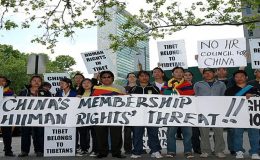“Serious Concern” About China’s Assimilation Policies and Residential Schools in Tibet
Today, UN human rights experts have expressed alarm about China’s residential schools in Tibet, which are part of a “large scale campaign [by the Chinese authorities] to assimilate Tibetan culture and language.” [1]
The Special Rapporteurs stated they are “very disturbed that in recent years the residential school system for Tibetan children appears to act as a mandatory large-scale programme intended to assimilate Tibetans into majority Han culture, contrary to international human rights standards.”
The recent move by UN Experts follows a UN communication sent to the Chinese government in November 2022 in which four Special Rapporteurs – on the right to education, cultural rights, freedom of religion or belief, and minority issues – raised serious concerns about China’s policies that attempt to assimilate Tibetan culture into Chinese “through a series of oppressive actions against Tibetan educational, religious and linguistic institutions, in contradiction with the right to freedom of religion and belief, the right to education and cultural rights of the Tibetan people.” [2]
The UN human rights experts’ concerns follow findings by Tibet Action Institute [3] that Chinese government policies in occupied Tibet [4] are forcing three out of every four Tibetan students between the ages of six and 18 into a vast network of colonial boarding schools. In addition, at least 100,000 four- and five-year-old children are estimated to be separated from their parents and living in boarding preschools [5] for at least five days in a week. [6]
Tibetan leaders and rights advocates have denounced China’s colonial boarding schools in Tibet as a part of a program of cultural genocide, and have brought the issue before the United Nations in order to shine a spotlight on this previously unknown policy that threatens to eliminate Tibetan childrens’ connection with their unique cultural identity within a generation.
Separated from their families and communities and almost completely cut off from their traditional culture, the nearly one million Tibetan children living in colonial boarding schools are forbidden to practice their religion, taught mainly in Chinese, and subjected to intense political indoctrination. “Students are restricted in following traditional Tibetan religious practices connecting them back to their families and communities”, the UN experts note.
The loss of family connection and support causes Tibetan children in these residential schools severe levels of alienation and trauma. As the UN experts make clear, it “produces deep and serious negative psychological and social impacts on such children, including loss of family connections, apathy, anxiety, interaction disorders, feelings of loneliness, isolation, alienation, homesickness, and other forms of physical or emotional distress.”
Reports from Tibet indicate that Chinese authorities use a variety of methods to coerce parents into sending their children away to these state-run institutions, including closing local schools so as to leave no other schooling alternatives. Those who dare to resist are subject to intimidation and threatened with financial and other punishments.
The communication was issued to the Chinese government on 11 November 2022 and they were requested to reply within 60 days. As of yet, they have failed to issue a response.
Lhadon Tethong, Director of Tibet Action Institute, said:
“China’s policy of separating almost a million Tibetan children from their families is shocking and we welcome the critical action taken by UN human rights experts to expose this most horrendous of human rights violations. We further call on governments to hold China accountable and urge them to end the residential school system in Tibet.”
Gloria Montgomery, Coordinator of Tibet Advocacy Coalition, said:
“Today’s press release and recent communication mark a turning point. Top UN experts have now sent an unequivocal and long overdue message: China’s residential boarding school system, which is part of a residential school policy to eradicate Tibetan language, culture and community, can no longer go unaddressed. The international community must now follow suit and urgently take meaningful action to hold the Chinese authorities accountable for these crimes. If we stand on the sidelines and do not act, we will witness the human rights of an entire culture collapse.”
Dr Gyal Lo, a Tibetan scholar and education expert, said:
“I have seen China’s residential schools in Tibet with my own eyes and the situation is very grave. While I applaud the four UN experts for giving the issue due attention, the UN and member states must act urgently to ensure Tibetan children can retain their language and culture and remain with their families.”
—
CONTACTS:
Lhadon Tethong, Tibet Action Institute, +1 (917) 418-4181
Tenzin Dorjee, Tibet Action Institute, +1 (646) 724-0748
Gloria Montgomery, Tibet Advocacy Coalition, +44 7541 362001
Mandie McKeown, International Tibet Network, +44 7748 158618
NOTES TO EDITORS:
1. UN experts alarmed by separation of 1 million Tibetan children from families and forced assimilation at residential schools, 6 February 2023, See the full text below.
2. Communication from Special Rapporteur on minority issues; the Special Rapporteur in the field of cultural rights; the Special Rapporteur on the right to education and the Special Rapporteur on freedom of religion or belief – https://spcommreports.ohchr.org/TMResultsBase/DownLoadPublicCommunicationFile?gId=27444
3. See Tibet Action Institute, “Separated From Their Families, Hidden From the World: China’s Vast System of Colonial Boarding Schools Inside Tibet,” 2021, pg. 17-21, available at: https://tibetaction.net/wp-content/uploads/2022/12/2021_TAI_ColonialBoardingSchoolReport_Digital.pdf
4. Historical Tibet includes the Tibet Autonomous Region and Tibetan Autonomous Prefectures and Counties in Qinghai, Gansu, Sichuan, and Yunnan Provinces.
5. In China these programs are described as “kindergarten.” In Tibetan areas, preschool education consists of at least two years of Mandarin-medium instruction, misleadingly called “bilingual education.”
6. Tibet Action Institute “Eyewitness: China Operating Mandatory Boarding Preschools Across Tibet, 2022: https://tibetaction.net/2022/05/24/eyewitness-confirms-mandatory-boarding-preschools-operating-across-tibet/
FULL TEXT:
China: UN experts alarmed by separation of 1 million Tibetan children from families and forced assimilation at residential schools
GENEVA (6 February 2023) – Around a million children of the Tibetan minority were being affected by Chinese government policies aimed at assimilating Tibetan people culturally, religiously, and linguistically through a residential school system, UN experts* warned today.
“We are very disturbed that in recent years the residential school system for Tibetan children appears to act as a mandatory large-scale programme intended to assimilate Tibetans into majority Han culture, contrary to international human rights standards,” the experts said.
In residential schools, the educational content and environment is built around majority Han culture, with textbook content reflecting almost solely the lived experience of Han students. Children of the Tibetan minority are forced to complete a ‘compulsory education’ curriculum in Mandarin Chinese (Putonghua) without access to traditional or culturally relevant learning. The Putonghua language governmental schools do not provide a substantive study of Tibetan minority’s language, history and culture.
“As a result, Tibetan children are losing their facility with their native language and the ability to communicate easily with their parents and grandparents in the Tibetan language, which contributes to their assimilation and erosion of their identity” the experts said.
They raised concerns about a reported substantial increase in the number of residential schools operating in and outside of the Tibet Autonomous Region and the number of Tibetan children living in them.
While residential schools exist in other parts of China, their share in areas populated by the Tibetan minority is much higher, and this percentage has been increasing in recent years. While on the national level the percentage of boarding students is more than 20%, information received point to the vast majority of Tibetan children in residential schools, almost one million children in total.
“This increase in the number of boarding Tibetan students is achieved by the closure of rural schools in areas which tend to be populated by Tibetans, and their replacement by township or county-level schools which almost exclusively use Putonghua in teaching and communications, and usually requiring children to board,” the experts said. “Many of those residential schools are situated far from the family homes of students boarding in them.”
“We are alarmed by what appears to be a policy of forced assimilation of the Tibetan identity into the dominant Han-Chinese majority, through a series of oppressive actions against Tibetan educational, religious and linguistic institutions,” the experts said.
UN experts said the policies run contrary to the prohibition of discrimination and the rights to education, linguistic and cultural rights, freedom of religion or belief and other minority rights of the Tibetan people.
“This is a reversal of policies which were more inclusive or accommodating in some respects,” the experts said.
In August 2021, the Central Conference on Ethnic Affairs called on all ethnic groups to be guided to always place the interests of the Chinese nation above all else.
“This call re-affirmed the idea of building a modern and strong socialist state based on a single Chinese national identity. In this context, initiatives to promote Tibetan language and culture are reportedly being suppressed, and individuals advocating for Tibetan language and education are persecuted,” the UN experts said.
The experts sent a communication to the Government of China on 11 November 2022 and remain in contact with the authorities regarding the issue.
ENDS
*The experts: Mr. Fernand de Varennes, UN Special Rapporteur on minority issues; Ms. Farida Shaheed, Special Rapporteur on the right to education, Alexandra Xanthaki, Special Rapporteur in the field of cultural rights






Leave a Comment